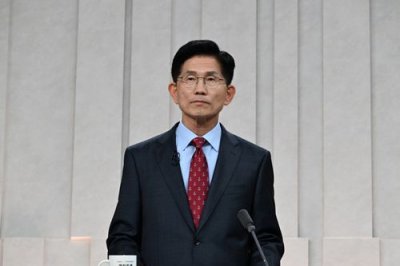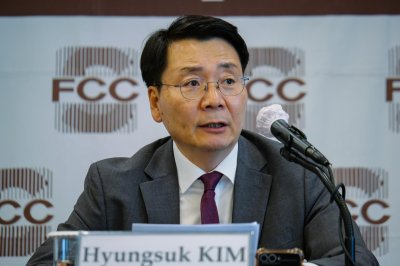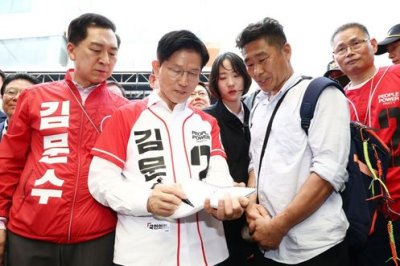Candidate profile: Kim Moon-soo – UPI.com

Kim Moon-soo of the People Power Party is set to run for the presidency in South Korea’s June 3 election. Photo by Kim Min-Hee/EPA-EFE
May 28 (UPI) — The People Power Party’s Kim Moon-soo, 73, is the main conservative candidate in South Korea’s June 3 snap presidential election. The former labor minister trails his liberal opponent, Democratic Party frontrunner Lee Jae-myung, by a large margin in most polls.
Kim emerged as a prominent labor and democracy rights activist in the turbulent 1970s, and as a former labor activist, he began his career in politics when he participated in the founding of the progressive People’s Party in 1990. Watching the collapse of communist countries in the late 1980s and early 1990s, he abandoned his “leftist view of labor” and shifted to a moderate stance, expressing the view that resources should be concentrated on growth while also improving welfare. He ran as a candidate for the conservative New Korea Party in 1996 and became a three-term lawmaker representing Bucheon. He was later elected governor of Gyeonggi Province in 2006 and won a second term in 2010. Kim served as Labor Minister under impeached President Yoon Suk Yeol in 2024-2025.
The PPP candidate was born in Yeongchon, North Gyeongsang Province, as the sixth of seven children in an impoverished household. He was able to enter business school at Seoul National University in 1970 but was expelled for his anti-dictatorship activism during the regime of President Park Chung-hee.
Kim found factory work after expulsion and grew deeply involved with the labor activist movement as well, rising to national prominence and facing arrest and torture by the authoritarian government during the 1980s. He eventually finished his university degree in 1994, some 25 years after first enrolling.
After a turn to the conservative camp in 1994 under the invitation of then-President Kim Young-sam, himself a former activist who moved rightward, Kim saw his political star rise as a lawmaker and then Gyeonggi governor. In 2014 he announced that he would not run for re-election, ending his term as Gyeonggi governor. Instead, he supported his party colleague Nam Kyung-pil. Nam was elected governor that year but lost to the Democratic Party candidate four years later, who was none other than Lee Jae-myung.
Kim re-emerged in the Yoon Suk Yeol administration and maintained support for Yoon even as some other primary candidates called for distancing the party from the impeached president.
He was the sole cabinet member who refused to stand and apologize for Yoon’s martial law attempt in a session at the National Assembly and won the strong backing of hardline loyalists who opposed impeachment.
Kim won the PPP nomination on May 3, but faced a late push by party leadership to replace him with former Prime Minister Han Duck-soo, who some saw as a less polarizing figure with a better chance of defeating Lee. An all-member meeting finally confirmed Kim as their candidate a week later.
Kim has outlined a conservative vision for the country in his campaign, touting business-friendly economic policies and a hard line against threats from North Korea, as well as promising to push through sweeping political and anti-corruption reforms.
Economy
Kim said he would be a “job president” in his acceptance speech for the PPP nomination in May, and has promoted business-friendly policies such as economic deregulation and tax relief. Like his opponent, Lee Jae-myung, Kim has vowed to make South Korea an AI powerhouse, promising to establish a $71 billion public-private fund to invest in infrastructure and technology development in the sector.
Other pledges include child support grants and housing assistance to help address South Korea’s declining birthrate crisis, and the expansion of nuclear power as an energy source.
If elected, Kim has vowed to meet with U.S. President Donald Trump immediately to negotiate tariffs and resolve trade issues.
Defense and Foreign Policy
In his nomination acceptance speech, Kim vowed to be a “security president who eliminates the fear of North Korea’s nuclear weapons,” and has signaled a hard-line stance similar to the approach taken by Yoon Suk Yeol.
He has called for strengthening extended deterrence capabilities under the U.S.-South Korea military alliance, including the potential of redeploying U.S. tactical nuclear weapons on the Korean Peninsula.
“If we can arm ourselves with nuclear weapons within the scope of the South Korea-U.S. alliance, we should do it,” Kim said during a presidential debate on May 28.
Kim has also called for enhancing South Korea’s own defense capabilities and has pledged to develop nuclear-powered submarines.
On May 26, Kim’s key foreign policy advisers said that the candidate would seek engagement with North Korea while maintaining a demand for its complete denuclearization, and would “proactively support” a summit between Trump and North Korean leader Kim Jong Un.
Government Reforms
Like his opponent Lee Jae-myung, Kim has proposed transitioning from South Korea’s current single five-year presidential term to a two-term, four-year presidency. He has promised to cut down his own term to three years if elected, allowing presidential and general elections to synchronize in 2028.
In the wake of the martial law crisis under Yoon, Kim has proposed decentralizing executive power and removing presidential immunity. He has also been deeply critical of the current Democratic Party-led parliament, calling it the “worst National Assembly dictatorship in history” over its opposition to Yoon and numerous impeachment motions. Kim has said he would slash the number of lawmakers by 10% and relocate the National Assembly to the administrative city of Sejong.
Kim has maintained a connection with Yoon and received the impeached president’s endorsement on May 17.
He issued an apology for the “suffering” caused by Yoon’s martial law attempt earlier in May and called it an “extreme measure” that he would not look to employ.
“If I become president in the future, I will not use martial law,” he said while campaigning. “I will complete democracy through dialogue, persuasion and patience to resolve any issues between the ruling and opposition parties.”
He also met two former conservative presidents, Lee Myung-bak and Park Geun-hye and received their support.




